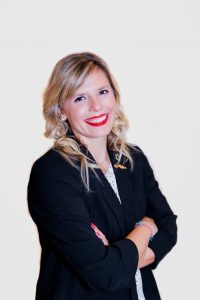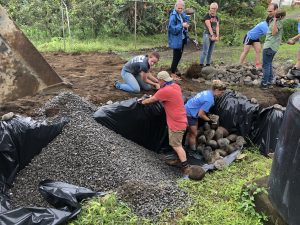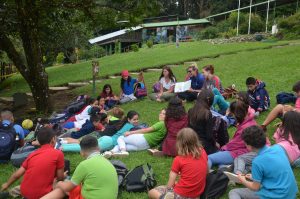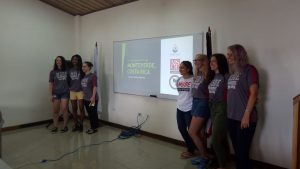Megan Livak, Students and Young Professionals Manager for the Water Environment Federation, made two trips to Costa Rica last year with international development group Global Water Stewardship. The group’s goal is to help enhance water security and create stronger working relationships between U.S. and Costa Rican water professionals. Read on as Livak discusses her travels and their significance.
In February 2019, I spoke with Central States Water Environment Association (CSWEA) Executive Director Mohammed Haque at the Partnering for Mutual Success Workshop hosted by the Water Environment Federation (WEF; Alexandria, Va.) and its Member Associations.

Megan Livak manages programming for the Water Environment Federation’s Students and Young Professional membership.
During our conversation, Mohammed told me about an amazing group of volunteers established in 2013 by CSWEA — mostly made up of students and young professionals — that are addressing sanitation issues in Costa Rica. The group, called the Global Water Stewardship (GWS; Crystal Lake, Ill.), provides a channel for young talents to use their skills to help educate locals and provide necessary knowledge exchange on wastewater treatment. GWS empowers the communities they visit, Mohammed said, and supports them in their journey to developing a professional wastewater industry.
That conversation inspired me to join GWS on two trips to Costa Rica later in the year. I didn’t realize what an effect these trips would have on my perspective and drive to get involved in development work until I saw the difference this small group of passionate volunteers could make.
Learning and Laboring
On our first trip in August, I spent a week alongside volunteers from CSWEA, the Pacific Northwest Clean Water Association, and the Florida Water Environment Association as we visited the cities of San Jose, La Fortuna, Monteverde, and Jaco. We were also joined by winners of the 2019 CSWEA Student Design Competition, who attend the Milwaukee (Wis.) School of Engineering (MSOE) and would be presenting their design for a new sanitation system in Monteverde to the local community.
Our first stop was a school in La Fortuna selected as the site for GWS’ 2019 Service Project. Because graywater from the school’s kitchen discharges directly into an area where the students played, GWS volunteers sought to create a biogarden that would collect this graywater, treat it naturally, and redirect its discharge away from the school’s playground area. Half of the GWS group built the biogarden while the other half held presentations for students about the importance of wastewater treatment.

During my first trip to Costa Rica with GWS in August, I participated in the organization’s annual service project. This year, we constructed a biogarden at Escuela Finca Zeta Trece in La Fortuna.
I helped line the pit and fill it with large stones and gravel through multiple downpours. The group was able to complete the biogarden in a single day, with the help of a backhoe truck supplied by the rural water association (known as an “ASADA”) serving La Fortuna.
I also had the chance to help the public education group engage more than 200 students about how people affect the water cycle and what happens after the water goes “away.” In one hands-on demonstration, students were separated into small groups and given a cup of water. Each cup contained additions, such as colorful aquarium rocks that represented large settleable solids, glitter that represented suspended solids, and coffee and tea, representing soluble organic, to simulate various wastewater pollutants. Volunteers then used the simulated wastewater to model the typical treatment process, using basic supplies around the school to demonstrate primary, secondary, and tertiary treatment.

We brought along many copies of Why Water’s Worth It, a recently released children’s book produced by WEF staff members Lori and Jon Harrison, to teach local students in Costa Rica about water conservation and the English language at the same time. The book was met with very positive feedback.
At our next stop, in Monteverde, the team from MSOE presented their competition-winning design — consisting of a complete sanitary collection system and a centralized water renewal facility — to locals at the Monteverde ASADA. The Monteverde community does not have an existing sanitary collection system or centralized treatment facilities, and with the expected population and tourism growth, septic tanks will not be sufficient given the density of expected residents. The community was very interactive, asking excellent questions. For 2020, CSWEA’s Student Design Competition problem statement will focus on designing a solution to help La Fortuna centralize its wastewater treatment.
A highlight of my August trip was getting to present WEF’s recently released Why Water’s Worth It children’s book to students in La Fortuna and Monteverde. The teachers and the students were so excited to receive this book — the students were not only learning about the importance of water, but also learning English, and the book was a great teaching tool.
Forging New Partnerships
I was so moved by the August trip, that I decided to come back in November to be a part of Costa Rica’s first-ever locally held Student Design Competition at the Costa Rica Institute of Technology (TEC) in San Jose. It was another whirlwind trip, with some amazing visits to San Jose, Samara, and Playa Flamingo.
The first few days of our November trip brought us to Samara, on the Pacific Coast of Costa Rica, where we attended the CONAFLU conference hosted by the Instituto Costarricense de Acueductos y Alcantarillados (AyA), a nationwide association for the Costa Rican water workforce.
To kick off the 2-day conference, a group of local young professionals in Samara set up a beach cleanup service event right near our hotel. A group of about 20 volunteers, equipped with gloves and trash bags, spent the morning picking up trash along the shoreline. Afterward, we set-up shop at the GWS/CSWEA booth and interacted with a wide range of attendees. On the second day of CONAFLU, the group facilitated a workshop which introduced GWS and shared how Student Design Competition teams in both the U.S. and Costa Rica were working on water infrastructure solutions in various areas around Costa Rica. This led to a meeting between GWS and staff of the Samara ASADA, where we started the conversation about locating the 2021 GWS Service Project there.

A team of students from the Milwaukee (Wis.) School of Engineering planned an expansion of sanitary services in Monteverde as its winning entry for the 2019 Central States Water Environment Association Student Design Competition. During the August trip, the team presented their design to local community members and water professionals.
It was then on to AyA headquarters in San Jose to attend the first Costa-Rican Student Design Competition. Three teams of environmental engineering students from TEC University spent about 30 minutes each presenting their solutions in Spanish, with their slides in both English and Spanish. All the presentations were excellent, and after much deliberation, the winning team was chosen. Through GWS and CSWEA, they will be sponsored to compete at the WEFTEC Student Design Competition in New Orleans in October 2020.
I had the opportunity to catch up with all the students and learn a little bit about each of them and why they are passionate about water. The resounding theme of their answers was that they were thrilled to have the opportunity work on a real-life project, come up with a real-life solution and put into practice the concepts they are learning. They get to make a real-life impact in their own communities.
|
My experiences in Costa Rica would not have been possible without the kindness, generosity, and professionalism of: Mohammed Haque Thank you for your contributions to this article. |
After the competition, I had a chance to speak with TEC University Engineering Professor Diana Zambrano about starting a WEF Student Chapter with her as the advisor to the group. After explaining what WEF Student Chapters are, the benefits, and how to form one, we started the initial process of having TEC University recognized and chartered by WEF. The chapter will be hosted under CSWEA.
I can’t begin to explain how thankful I am to have been invited to Costa Rica with GWS. I am super passionate about water and being able to make a true difference in the lives of so many makes my heart so full. I am in awe of the dedication and commitment of the CSWEA/Global Water Stewardship volunteers, who continue to develop new initiatives to help inspire and empower the communities they work in. These wonderful people, who have become my family, truly love what they do, and it shows through their commitment to their work. Water is life, and our industry is filled with amazing volunteers that want to truly make a difference by bringing #SanitationForAll. Thank you for such unforgettable opportunities and thank you for all that you do for WEF and the water sector.
And, an even bigger thank you to Mohammed Haque, for all that you do for CSWEA, GWS, and WEF — you are a true water hero!
─ Megan Livak, WEF Students and Young Professionals Manager








January 27, 2020
Featured